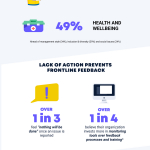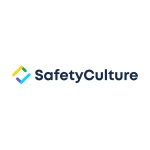Operations, safety and health and wellbeing, deemed the most important topics within an organisation
Feedback from the Field research report reveals:
- Fear of retaliation and lack of management action prevents frontline feedback
- Frontline staff do not feel empowered to directly solve issues
- Having a valued voice and quality training are key for frontline job seekers
SYDNEY--(BUSINESS WIRE)--The majority of American, Australian, and British frontline workers (67%) say that they are never, rarely, or only sometimes listened to on topics that matter to them the most � operations (54%), safety (46%), and health/wellbeing (49%) � according to new research by SafetyCulture. In fact, 66% of American frontline workers said they are rarely, never, or only sometimes listened to by management on these important topics.
SafetyCulture�s new Feedback from the Field research features the views of American, British and Australian �frontline workers� � defined as individuals who must �physically show up to their job� including the likes of hospitality, retail, manufacturing, and logistics workers.
When it comes to taking action, just over one in four American and Australian frontline workers (27% each) feel empowered to take action and solve an issue themself. In the UK, just over one in five frontline workers feel empowered to tackle issues (22%).
Frontline workers fear job loss when reporting COVID-19 adherence issues
Job loss as a result of reporting a safety or quality issue to management, including adherence to COVID-19 protocols, is a real concern for many frontline workers. Almost half of Australian frontline workers (48%), more than a third of American frontline workers (36%), and more than one in five British frontline workers (22%) agreed this is a potential scenario.
To tackle this issue, SafetyCulture has developed its operations platform to empower staff to report issues, giving them a voice within the workplace. Its new capture and notify functionality further connects leaders and frontline workers to help address under-reporting. The technology allows for sensitive feedback to be shared via anonymous entry.
Lack of action prevents frontline feedback
Fears aside, over one in three frontline workers (34%) agree their willingness to provide workplace feedback is impacted by a belief that �nothing will be done� once reported. More than one in four said they lacked confidence management would address safety issues they raise.
Bob Butler, Global General Manager of SafetyCulture said, �While frontline workers have kept our nations running over the past 18 months, many don't feel that their voices are valued. It�s clear that these critical workers want a say in the operations and running of their workplaces. Two-way communication between frontline workers and management is no longer a �nice to have�, it is a business imperative. Leaders need to be arming their teams with the right tools to allow them to add value, be heard, and stay safe.�
Training beats a competitive holiday allowance
As many organisations navigate The Great Resignation of 2021, SafetyCulture�s research also reveals that quality training is of key importance to frontline jobseekers when considering a new role. Seven in ten frontline workers (70%) describe training as either very important or a top priority ahead of a competitive holiday allowance (40%).
Feeling confident they have a valued voice was also important for frontline workers when considering new roles, according to 72% of Australian, 60% of American, and almost half of British (48%) frontline workers.
Darren Winterford, CEO of EdApp, an award-winning mobile-first training platform, said, �It�s important to clarify that deskless workers aren�t after any old training. Summoning teams to a white-walled room to digest endless slides no longer cuts it. Mobile learning is quickly becoming the most accessible way to get training out to those in the field or working remotely. For training to be a successful retention and recruitment tool, it needs to be an experience learners will actually enjoy and be in sync with today�s digital habits.�
To read the full report visit: https://safetyculture.com/ebooks/feedback-from-the-field
SafetyCulture�s new mobile-first �issues� feature is available now via iAuditor for free. For information on how organizations can get started and gain real-time insight into what is happening in the field visit: https://safetyculture.com/issues.
About the Research
All figures, unless otherwise stated, are from YouGov Plc. Total sample size was 1950 adults (861 US, 554 Australia, 535 UK). Fieldwork was undertaken between 27th August - 9th September 2021. The survey was carried out online. The figures have been weighted and are representative of US, UK and AU frontline workers (aged 18+).
About SafetyCulture
SafetyCulture is the operational heartbeat of working teams around the world. Its mobile-first operations platform leverages the power of human observation to identify issues and opportunities for businesses to improve everyday. More than 28,000 organizations use its flagship products, iAuditor, and EdApp, to perform checks, train staff, report issues, automate tasks and communicate fluidly. SafetyCulture powers over 600 million checks per year, approximately 50,000 lessons per day and millions of corrective actions, giving leaders visibility and workers a voice in driving safety, quality and efficiency improvements.
Recent analysis by Forrester found that SafetyCulture�s flagship products provide a 214% return on investment for customers, and USD $3.6M in cost savings from operational improvements.
Customers of SafetyCulture�s award-winning products include the likes of Shell, United Nations, Virgin Active, Cathay Pacific, Mars, and BP Chargemaster.
Contacts
Media contact:
Chloe Mugwangi | chloe.mugwangi@ogilvy.com.au | +61 420 234 338













